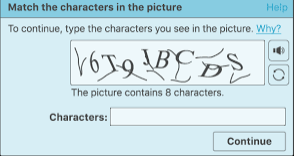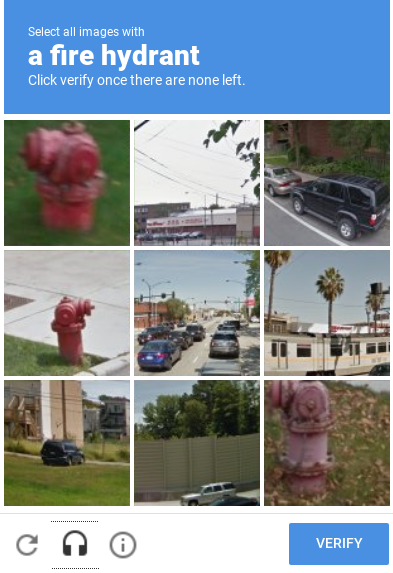How many times have you been annoyed by repeatedly being asked if you are a robot? Everything we do on our phone or computing device requires us to prove we’re not a robot.
Too often, we are challenged with the puzzle below and squint to make out letters or numbers mashed together, stretched out or turned sideways. Holding a mirror in front of it or using your smartphone doesn’t help.

Other times, we are asked to ‘check the box’ to declare we’re not a robot, and that’s good enough.

But sometimes it’s not, and we’re then taken to another puzzle, one challenging our eyesight and patience. It’s frustrating when you complete one, only to be shown another. You never see what you missed on the previous one.

What is the reason for all of this? Doesn’t the internet cloud know the difference between a human and some artificial life form? The answer is a resounding no. The Internet cloud only knows you by an Internet Protocol (IP) address you carry from place to place. For any website you visit, like Target.com or npr.com, you are identified by a set of four numbers (0-255) separated by decimal points (e.g., 192.158.1.38). Before any interaction like logging in or filling out a form, most sites want to be sure you are not some robotic process (bot for short) whose intent is to SPAM (unsolicited email or promotion) the site or, worse, deploy malware to damage the site. So, like the TSA and metal detectors at airports, everyone is screened to prevent evil or ignorant people from bringing dangerous items on our flights.
This robot screening process for websites is a Turing test to tell humans and robots apart, which is known formally as CAPTCHA, which stands for Completely Automated Public Test to Computers and Humans. Many software vendors create CAPTCHA, which companies integrate into their websites. Most are free to use, including those provided by Google.
As seen above, CAPTCHAs come in all shapes and sizes. Some ask more of the user to prove their humanity than others. They even like to be called something different. Above, the check box and resulting fire hydrant selection CAPTCHA is known as reCAPTCHA and is provided by Google. No one knows why, except maybe the ‘re’ accentuates it. It’s a free plugin.
There is potential relief on the horizon from having to complete these CAPTCHA puzzles. Research is being conducted for something called noCAPTCHAs. These operate under the covers of the website; you won’t be asked to perform any puzzle-solving here. Instead, your mouse movement and other human behavior are observed by the noCAPTCHA software. If it meets the programmed criteria of human behavior, it passes; if it doesn’t, the user is declared a robot and further interaction on that site is blocked.
So, like most things in life, annoyances are often resolved through a better understanding of their reason. Also, with anticipated technological advancements, we should soon be able to visit websites without proving we’re human.
